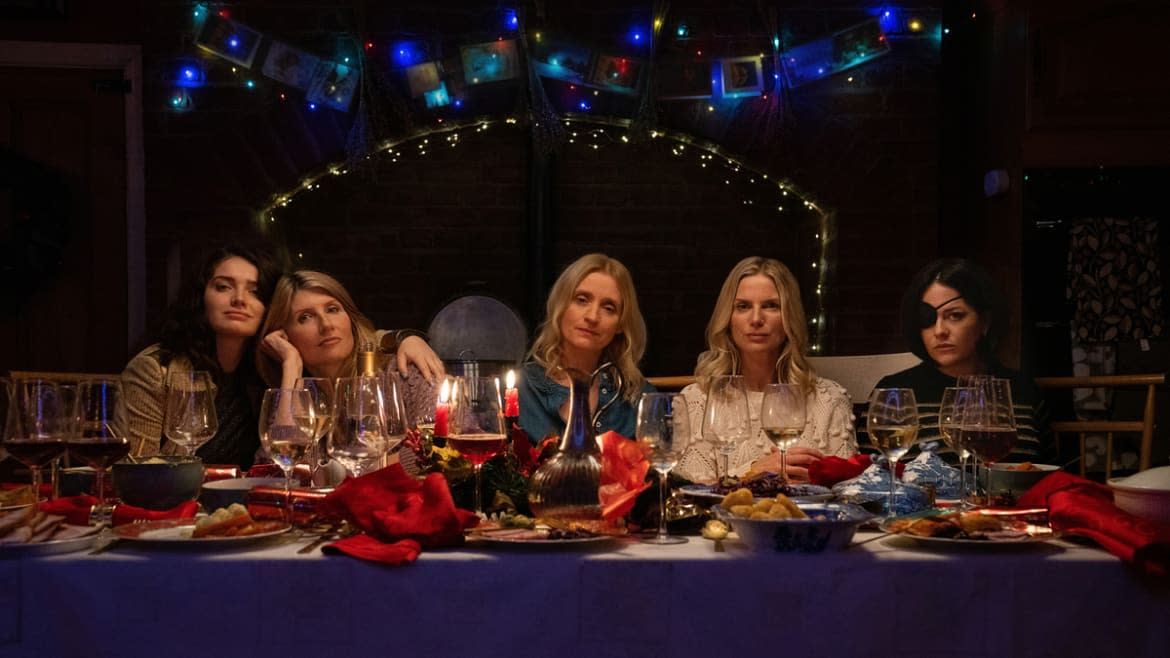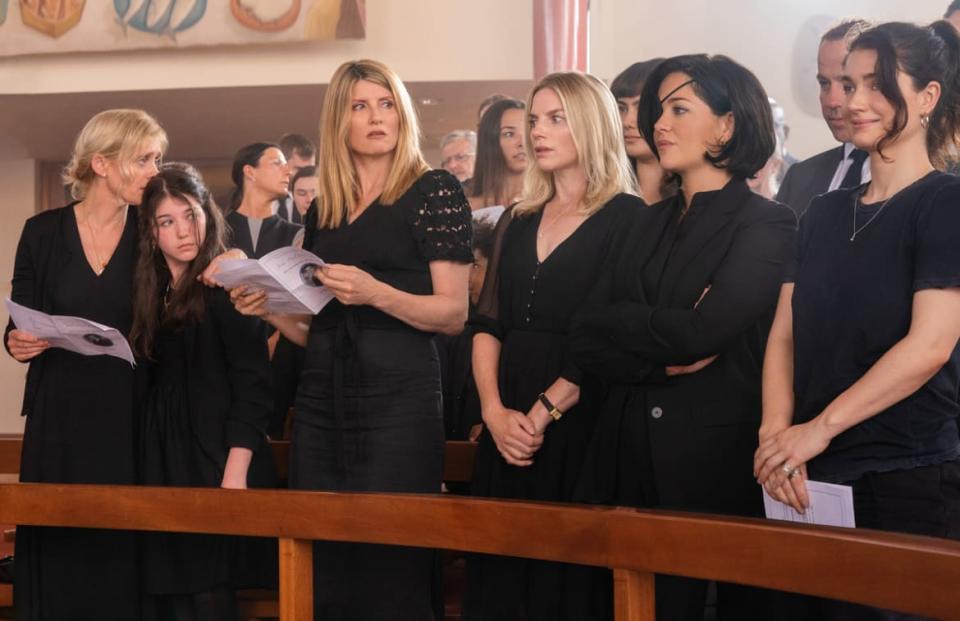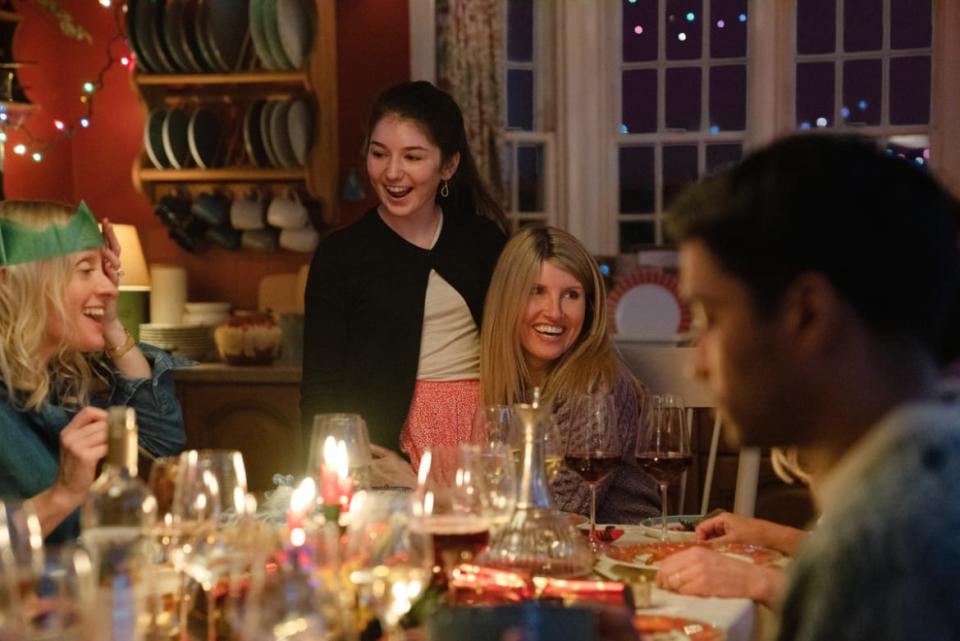‘Bad Sisters’ Proves How Much Fun It Is to Kill Bad Men

I’ll never forget the feeling of being 7 years old and realizing that The Chicks’ “Goodbye Earl” was about three best friends murdering their other friend’s abusive boyfriend.
A babysitter of mine used to play the song from the stack of CDs in my parents’ collection, and I had listened to it 50 or more times without it ever registering. I hadn’t yet mastered the concept of attaching meaning to song lyrics. When it finally clicked, it was like my mind had been thrust through an Interstellar-level wormhole. I could see everything around me with 20/20 vision. Every sense was heightened. The concept of women banding together to gleefully kill an evil man changed everything for me.
In the years that have passed, women killing men for the greater good of the world has become my favorite genre of media. Give me a revenge film and I’m there. A true crime doc about an abusive adulterer meeting his demise? I’ve already seen it. I hold Quentin Tarantino’s Death Proof and Taylor Swift’s “no body, no crime” in equal reverence.
So imagine the childlike delight that washed over me when firing up Bad Sisters, the new Apple TV+ series about, you guessed it, some very bad sisters.
Almost immediately, I recalled that old, familiar feeling of my “Goodbye Earl” days. Bad Sisters is just like The Chicks’ song, except there are four culprits. And they’re related. And they’re Irish. So maybe not just like the song, but all of the same gratuitously enjoyable, novel-like plotting is still there—now turned up to an 11 for one of the single most boisterous shows of the year.

Adapted from the 2012 Belgian series Clan, Bad Sisters stars Catastrophe’s Sharon Horgan as Eva Garvey, the voice of reason among her four other sisters: Ursula (Eva Birthistle), Grace (Anne-Marie Duff), Bibi (Sara Greene), and Becka (Eve Hewson). Though Eva is slowly spinning out and teetering on the edge of full-blown alcoholism, she’s still somehow the most put-together of her sisters, who have all been bound together by the early-in-life death of their parents. Though each sister has since been crawling through her own layer of muddy discord, no one has been suffering more than Grace.
Seeking a source of stability after her parents’ death, Grace became enmeshed with John Paul (Claes Bang), a charismatic but deceptively insidious piece of trash dressed in a suit. The four other Garvey sisters collectively refer to him as “The Prick,” growing more insular in their quartet by bonding over their mutual detest for John Paul. Though they’ve tried their best to see Grace as often as possible and include her in everything they do, John Paul’s constant and controlling presence casts a dark cloud over every family event.
A series of time jumps reveals John Paul’s increasingly evil patterns of abuse amongst the whole family. Each sister has come to a breaking point with their brother-in-law, causing them to colloquially joke about ridding him from their lives forever. But once that seed is planted, John Paul can’t help but overwater it.
‘Catastrophe’ Is TV’s Most F**ked Up Rom-Com
See, JP isn’t just a prick. He’s a misogynist, racist, self-aggrandizing, belittling, piece-of-shit, world-class asshole—sorry, arsehole. The kind of freak that thinks that his teenage daughter having a bra is sexualizing her. The kind of abusive narcissist who will immediately stoop to the lowest of the low when insulting someone and leverage a secret against them to keep his wickedness from being exposed. If “gaslighting” hadn’t already devolved into the overused phrase of the minute, he’d be the new dictionary definition.
So when Bibi tosses around the idea of giving nature a helping hand, her sisters can’t help but listen. After all, she says, John Paul’s not a man, he’s that man.
It’s here where Bad Sisters does something absolutely majestic. By grounding its riotous premise in deep sisterly love, the show takes on a true sheen of believability. Sure, we’re supposed to be laughing while watching this family plot and attempt to kill someone, but one can’t help asking themselves, “Wouldn’t I do the same? Could I?”
The show’s title isn’t just referring to the Garvey sisters’ scheming, but nodding to the fact that they each feel a profound guilt for letting things get this far. Over the years, they’ve witnessed Grace shoulder the consequences of John Paul’s abuse, her existence growing smaller with each passing indignity. Anne-Marie Duff gives a splendid performance opposite Claes Bang’s imposing John Paul, effectively wearing the physicality of someone suffering great emotional abuse without ever compromising the glimmer of light that Grace’s sisters still see in her—despite JP’s attempts to snuff it out.
How ‘Divorce’ Creator Sharon Horgan Became the Master of Marital Discontent
Which is not to say that Bad Sisters is all doom and gloom, either. The show’s writers understand the intrinsic comedy in siblinghood, how you know your family better than anyone else, and even just witnessing that connection ebb and flow is both highly comical and endlessly engaging. The deft weaving of comedy and drama is not an easy feat, especially when handling a subject matter as real as abuse. But Bad Sisters makes it look as easy as a brisk walk along the picturesque Irish coastline.
There’s also more than one family dynamic at play here. The Garveys’ inadvertent foes have become Thomas and Matthew Claffin, the “sons” portion of Claffin & Sons, holders of John Paul’s hefty life insurance policy. To avoid a payout that will bankrupt their struggling family business instantly, the Claffins have elected to start looking into the circumstances surrounding JP’s death. And though the Garvey sisters have tried their hardest to make their brother-in-law’s death a coroner-ruled accident, the Claffins prove an unexpectedly formidable foil.
We know from the very start of this story that John Paul doesn’t make it out of this alive, but that doesn’t make watching the sisters’ attempts at killing him any less humorous. John Paul’s offenses aren’t just cruel, they’re downright nasty and violating. Amid all my rooting for his demise, I found myself fascinated by just how many ways the writers could find for a man to be evil. Just when we think we’ve seen every horrible deed a man could commit, we’re reminded that men always find a way to outdo themselves.
On that front, Bang is a marvel. There’s no other way to put it. An actor with that much natural charm could very easily flub this role, but John Paul is a well of endless smarm. He’s the kind of slimy worm that you feel repulsed by with just one look. He makes you wonder how someone hadn’t already taken JP out before the Garvey sisters set their lethal sights on him.

Every component of Apple TV+’s latest offering works in tandem as one happy family to make this show a rollicking good time. But at its heart, Bad Sisters always comes back to the Garveys. It's rare to see the dynamics of sisterhood depicted with such veracity. Grace, Eva, Bibi, Ursula, and Becka are all highly complicated and completely singular. They love, hate, fight, and bicker as any sisters would and do, but when they come together, their bond is unbreakable.
Though I might’ve been initially stricken by the nostalgic comforts of seeing a band of women killing a ne'er-do-well—yes, I realize how bizarre that sounds—my very favorite scenes happened when the subject of the Garvey’s loathing was nowhere to be found. Seeing these women just take time to be a family elevated Bad Sisters beyond a pleasant surprise and seated it among the ranks of my favorite shows of the year. Nothing could feel more homey than being welcomed into their bond with one simple phrase that says so much: “Put the kettle on.”
Keep obsessing! Sign up for the Daily Beast’s Obsessed newsletter and follow us on Facebook, Twitter, Instagram and TikTok.
Get the Daily Beast's biggest scoops and scandals delivered right to your inbox. Sign up now.
Stay informed and gain unlimited access to the Daily Beast's unmatched reporting. Subscribe now.
Solve the daily Crossword

